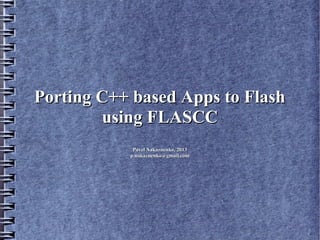
Porting C++ apps to FLASCC
- 1. Porting C++ based Apps to Flash using FLASCC Pavel Nakaznenko, 2013 p.nakaznenko@gmail.com
- 2. This presentation is about Adobe Flash AlchemyFLASCC technology Porting application to Flash with FLASCC Problems I've faced
- 3. Adobe Flash Cross-platform multimedia technology Vast userbase, broad platforms coverage Flash Player – standalone or plug-in AVM2 – ES4 based JIT VM AVM2 executes SWF bytecode
- 4. Adobe Flash 11.4 3D Hardware acceleration Shader support Multi-threading
- 5. C++ to Flash – How? Porting manually = very long and resource demanding process Converting logic code to AS3 (CodeGen) + Flash Wrapper = very error prone Other ways?
- 7. LLVM – low level virtual machine RISC-like language independent instruction set and type system Link time optimization, Compile time optimization Plenty of back-ends: x86, x86_64, AMD64, PowerPC, MIPS, partially ARM Many front-ends: C++, ObjC, Fortran, Ada, Haskell, Java, Python, Ruby, AS3, GLSL, D, Rust and more is coming
- 8. Adobe FLASCC (Alchemy) Compiling C++ code into low level virtual machine (LLVM) bytecode Performing LLVM compile- and link-time optimization Compiling LLVM bytecode into AVM2 bytecode Processing resulting files with Flash Compilation Pipeline as usual.
- 9. Porting to flash in 7 steps 1) Download FLASCC sdk 2) Follow ReadMe installation instructions 3) Use tutorials to setup basic I/O, threading and rendering 4) Create makefile 5) Use Scout to profile 6) Use GDB to debug … Profit!
- 10. FLASCC features at glance GCC based toolset + Cygwin in redist Some libs have been already ported: SDL, zlib, vorbis ogg, box2d, libqren, Bullet, Lua, etc. See Adobe website for details Hardware accelerated 3D via Stage3D calls GLS3D – OpenGL-like wrapper for Stage3D API AGAL - HLSLGLSL like shading language P-threads, OpenMP supported GDB for debugging Scout for code, memory, Stage3d profiling
- 11. Not as good as it looks Very raw technology stack Tools fall out with OutOfMemoryException when trying to build debug version of big project (the size of UE3). One line of code change in .cpp = 15 minutes build for big projects. Think carefully before you build! Profiling tool wasn't working till the very end of integration
- 12. Not as good as it looks – part two Growing Pains – claimed functionality doesn't always work No AVM2 low-level multi-threading support Significant overhead for threads and memory sharing Still have to convert content yourself Have to write a lot of wrappers (RHI, I/O, Net etc)
- 13. VFS or speaking of wrappers VFS – Virtual File System, unified way to load files and stay POSIX compliant Part of FLASCC sdk guidelines Flash is not permited to perform arbitrary I/O You decide how to populate it: embed data or load run-time FLASCC provides implementation for common cases (Web storage, Local Shared Object, Embedded storage)
- 14. ES2API or speaking of wrappers pt. 2 Wraps Stage3D API around GLES1.0 API Part of Adobe in-house codebase (not available for public) Still WIP
- 15. Adobe Flash Threading Implementation Specifics Back-end: Bytecode is compiled into separate blob, which runs on new instance of AVM2 in the background. Front-end C++ : POSIX compliant thread functionality (pthreads) Available atomic operations: __sync_*** family Front-end AS3: Worker, Mutex, Condition classes (flash.concurrent package) The Flash Player runs on UI (Primordial) thread Game code entry point could be reached two different ways: startBackground and startAsync
- 16. Problems I've faced Worker can not access Stage3d Worker can not perform IO with filesystem, due to sandbox restrictions Entry point can not be called with startBackground due to the bug with static object construction. Memory sharing comes via messaging = have to serialize your object and de-serialize it every time you want to change the data Memory copy and access impersonation are only viable options
- 17. Problems I've faced – pt. 2 Start application with startAsync, spawn game thread in entry point (workaround for startBackground problem) Every call for an impersonation gives overhead of 16ms avg. while (true); on UI thread locks the whole Flash Player To impersonate call you have to wrap the function you would like to be executed on behalf of another thread as void* function(void *args); Severe memory fragmentation due to small allocation and Flash Player GC (Mark & Sweep) Low memory limit – approx 600 Mb for app, 1.4Gb for Player (Windows) No memory page protection. This will work: *((int*)0) = 100;
- 18. Debugging (general) GDB support only for small-scale projects No debugging possible for big codebase. So no breakpoints, step-by-step, etc Tons of inline_as3(“trace((new Error()).getStackTrace());n”); Use your brain. Because any build takes at least 15 minutes. Watch flash log with “tail” like programs, i.e. “Baretail”
- 19. Debugging (rendering) Flash Stage3D uses DirectX driver on Windows platform Stage3D API calls ≈ DirectX API calls AGAL ≈ HLSL Windows Standalone Flash Player is an ordinary DirectX based application Use PIX to debug rendering!
- 20. Profiling Adobe Scout profiling tool Requires -advanced-telemetry flag to be passed to compiler (will be supported in later drops) Python script is used to add telemetry flag. Allows rendering, memory, calls, display lists profiling. Supports threads. Sometimes may be used for debugging
- 22. Bonus links http://www.adobe.com/devnet/games/articles/compiling-opengl-games.html http://gaming.adobe.com/technologies/flascc/ http://blogs.adobe.com/flascc/ https://github.com/alexmac/alcexamples https://github.com/alexmac/alcextra https://github.com/adamcath/telemetry-utils https://github.com/alexmac/ http://www.baremetalsoft.com/baretail/